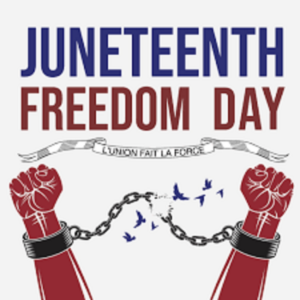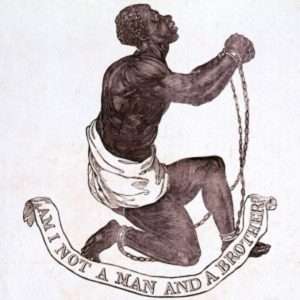The Volokh Conspiracy
Mostly law professors | Sometimes contrarian | Often libertarian | Always independent
Juneteenth Celebrates a Great American Achievement
The emerging culture war over the holiday is misguided. In reality, Juneteenth celebrates one of the greatest triumphs of America and its founding principles.

Today is Juneteenth, the holiday commemorating the abolition of slavery in 1865 - established as an official federal holiday in 2021. You might think that commemorating an event like the abolition of slavery would be uncontroversial. But, like almost everything else these days, Juneteenth has gotten swept up in the left-right culture war. A recent University of Massachusetts poll found that 69%of Democrats, but only 13% of Republicans and 32% of independents supported making it a federal holiday. The ideological divide mirrors the partisan one (77% of self-described liberals express support, 40% of moderates, and only 14% of conservatives).
There are various possible non-ideological reasons why people might oppose the establishment of this federal holiday. For example, some might believe there were too many federal holidays already. In addition, a large minority of respondents (39%), simply don't know what Juneteenth is; if you don't know what the holiday celebrates, you might quite reasonably refrain from expressing support until you know more. Some of those who don't know the right answer about what Juneteenth commemorates actually endorsed wrong answers (14%) as opposed to simply saying they don't know (25%). Members of the former group, too, may have reasons for opposing the holiday that have little to do with left-right ideological divisions.
But the stark partisan and ideological divide in support for Juneteenth suggests that much of the opposition is based on fears - expressed in 2021 by Republican critics of the establishment of the holiday - that it represents a form of left-wing identity politics, an attack on America, or a repudiation of July 4.
Nothing can be further from the truth. In reality, Juneteenth celebrates one of America's greatest achievements. And the way that achievement came about is an indictment of bigotry and racial identity politics, both left and right.
In 2021, I wrote a post about the meaning of the then-newly instituted federal holiday that covers these points in more detail, and I think remains relevant today. I reprint it with some modifications below:
Juneteenth commemorates the abolition of slavery in 1865. Some conservatives who opposed its establishment as a national holiday argue it might somehow detract from Independence Day on July 4, or promote left-wing identity politics. For their part, some on the left may view it as a condemnation of America's history of slavery and racism, or even a celebration of black nationalism.
In reality, however, the abolition of slavery was the greatest achievement of the universal principles underlying the American Revolution, and a rebuke to ethnic nationalism and separatism. Slavery was America's worst injustice, and its abolition is obviously worthy of celebration.
Abolition was only achieved thanks to a multiracial movement that emphasized the universality of the right to liberty, and the moral arbitrariness of distinctions based on race.

It is no accident that the antislavery movement was also accompanied by what historian Kate Masur calls "America's First Civil Rights Movement," which sought equal rights for blacks that went beyond simply abolishing slavery.
As Masur and other scholars have documented, both black and white abolitionists routinely cited the universalist principles of the Founding in making the case for abolition and racial equality, even as many of them also criticized the Founders (and later generations of white Americans) for their hypocritical failure to fully live up to their own principles. From early on, critics of the American Revolution denounced the contradiction between its professed ideals and the reality of widespread slavery. "How is it," Samuel Johnson famously wrote, "that we hear the loudest yelps for liberty among the drivers of negroes?"
While the hypocrisy and contradictions were very real, so too is the fact that Revolution and Founding made abolition possible, in part by giving a boost to universalistic Enlightenment liberalism on both sides of the Atlantic. Among other things, it inspired the First Emancipation in the US (the abolition of slavery in the North that became the first large-scale emancipation of slaves in modern history). Without the First Emancipation, we could not have achieved the second and greater one.
For all their failings, the Revolution and Founding paved the way for abolition. That happened in large part because they were the first large-scale effort to establish a polity based on universal liberal principles rather than ties of race, ethnicity, or culture.
Those principles are at the root of most of America's achievements, of which the abolition of slavery was among the most important. They are also what enabled America, at its best, to offer freedom and opportunity to people from a wide range of racial and ethnic backgrounds from all over the world.
Abraham Lincoln, who issued the Emancipation Proclamation whose belated enforcement Juneteenth celebrates - put it best in his famous speech on the Declaration of Independence and its implications for slavery:
I think the authors of that notable instrument intended to include all men, but they did not mean to declare all men equal in all respects…. They did not mean to assert the obvious untruth, that all were then actually enjoying that equality, or yet, that they were about to confer it immediately upon them…
They meant simply to declare the right, so that the enforcement of it might follow as fast as circumstances should permit.
They meant to set up a standard maxim for free society which should be familiar to all: constantly looked to, constantly labored for, and even, though never perfectly attained, constantly approximated, and thereby constantly spreading and deepening its influence and augmenting the happiness and value of life to all people, of all colors, every where.
The success of the antislavery movement's appeal to liberal universalism has been a model for later expansions of freedom, as well - including equal rights for women, the Civil Rights Movement of the twentieth century, and the struggle for same-sex marriage. It is a model that advocates of migration rights would do well to emulate today.
The work of fully living up to the ideals of the Founding wasn't completed in Lincoln's time, and it remains seriously incomplete even now. But Juneteenth commemorates perhaps our greatest step in the right direction. And it reminds us that further progress towards liberty and equal rights depends on emphasizing the same principles that made abolition possible.
UPDATE: Some commentators on Twitter and elsewhere point out that slavery was not fully abolished on June 19, 1865, which was merely the date when Union troops reached Galveston, Texas, and announced the implementation of the Emancipation Proclamation in one of the last parts of the former Confederacy where it had not yet been implemented. Slavery in the US was not fully banned until the ratification of the Thirteenth Amendment in December 1865. I am well aware of this. But the Juneteenth holiday is nonetheless is meant to commemorate the end of slavery as a whole, and that is in fact how it has been understood for many decades, long before it became a federal holiday.
July 19 is the traditional date for commemoration of abolition, even if it is not the anniversary of the day on which the last vestiges of slavery were actually banned. Similarly, we celebrate Independence Day on July 4, even though July 2, 1776 was the date when the Continental Congress actually voted for independence.
If people want to move the celebration of abolition to some other appropriate date, such as the day of ratification of the Thirteenth Amendment, I don't object. But that's not what most objections to Juneteenth have been about.


Show Comments (126)